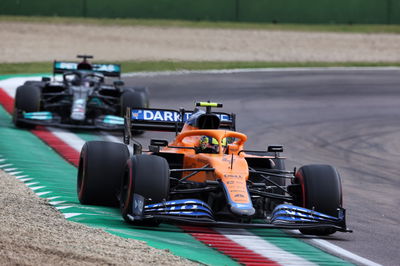McLaren wants secret ballot voting to be used for F1 rule changes

Writing in a wide-ranging column on the future of F1 for McLaren’s website, Brown highlighted his concerns about growing alliances between teams, a subject which has caused great debate and controversy in recent years.
Brown believes that secret voting would prevent teams from feeling pressured to vote in a certain way in order to satisfy a team it has built a close partnership with and help F1 come to decisions that ultimately benefit the sport.
“Currently, decisions about the future of the sport can be halted by a minority, rather than majority, and they are further skewed by some teams’ voting power being in favour of their affiliated team partner,” Brawn said.
"There have even been instances when an affiliated team, to satisfy its bigger partner, has voted in favour of a clear disadvantage to itself. This isn’t sport. This isn’t putting the fans first.
“It is a situation that must be addressed and so we call for secret ballot voting to be implemented in all F1 Commission meetings with immediate effect.
“In other sports the regulatory body has the power of governance because they always focus on what is in the best interests of the sport overall, which should be the key consideration in Formula 1.
“With a change in the voting procedures, it could lead to more agile decision-making that would ultimately benefit the interests of the fans and in doing so the sport at large, including the participants.”
Out of the 10 teams currently competing in F1, Alpine is the only one that does not hold close ties to another outfit.
“The rise of team affiliations has become unhealthy for our sport,” Brown added.“It is not in the best interests of competition if two rivals, or even three, share assets and align strategically. One of the fundamental principles of Formula 1, as opposed to other one-make racing series, is an open competition between constructors.
"I do not wish to see the number of teams in F1 reduce, but team affiliations remain an issue because they do not promote a level playing field. This is where further changes need to be made to the governance of Formula 1.
“There have always been conflicts of interest in Formula 1 and it’s unlikely to change anytime soon, so it’s even more important that F1 and the FIA, who have no other agenda than the whole sport’s success, call the shots in the best interests in F1 and not be blocked and slowed at every turn.”

![Toprak Razgatlioglu, ROKiT BMW Motorrad, BMW M 1000 RR [Gold & Goose]](https://cdn.crash.net/2024-09/GnG_1165424_HiRes.jpg?height=90)






![Johann Zarco, LCR, Honda RC213V, 2024 San Marino MotoGP, Misano, action [Gold & Goose]](https://cdn.crash.net/2024-09/GnG_1166323_HiRes.jpg?height=90)

![Jack Miller, KTM Factory Racing, KTM RC16, San Marino MotoGP, Misano, action [Gold & Goose]](https://cdn.crash.net/2024-09/GnG_1167624_HiRes.jpg?height=90)